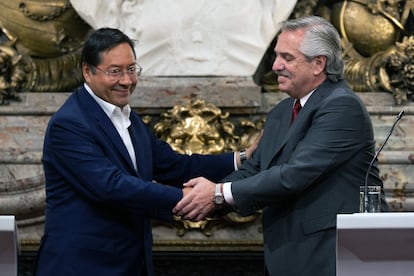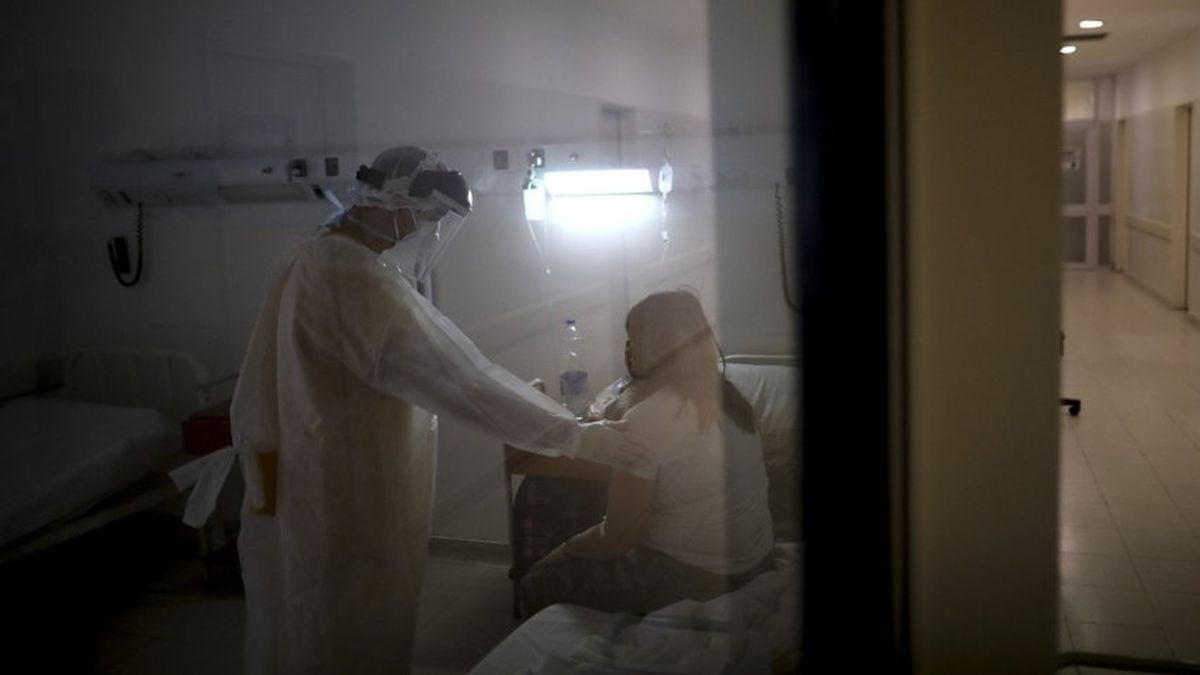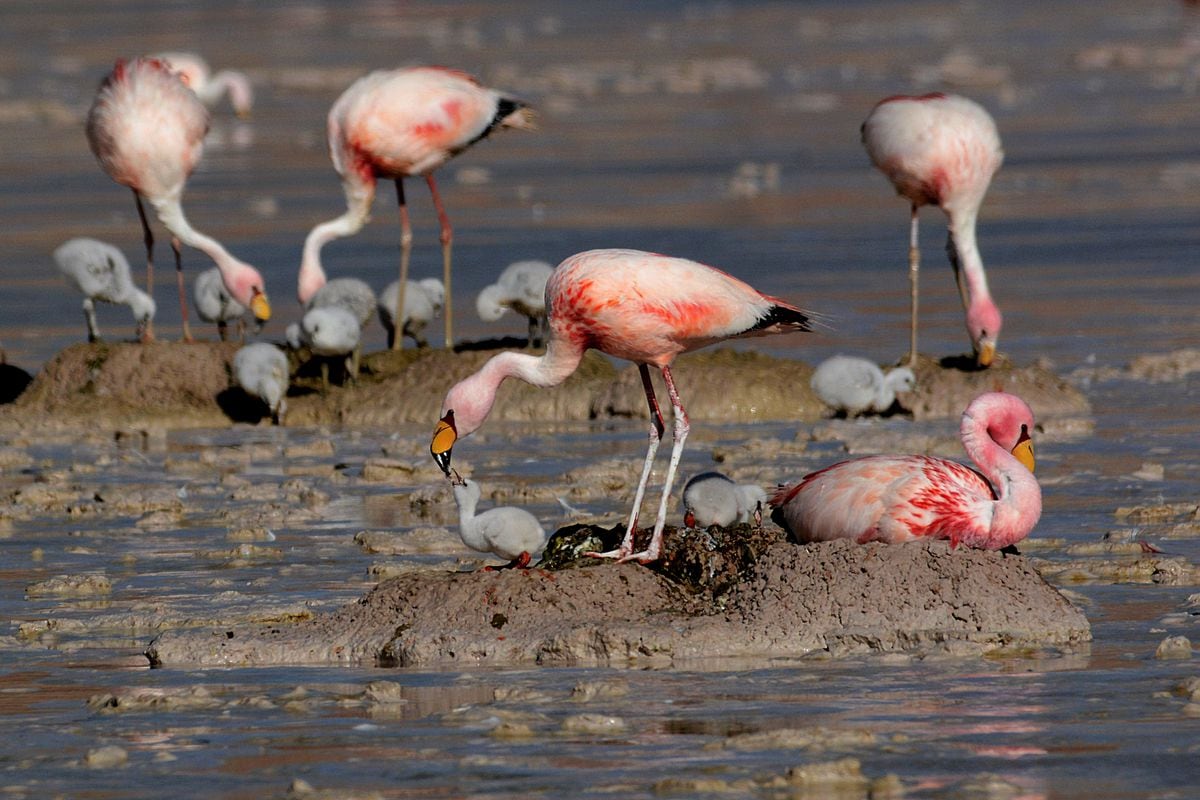The presidents of Bolivia and Argentina, Luis Arce and Alberto Fernández, this Thursday in Buenos Aires. TOMAS CUESTA (AFP)
Autumn is taking a long time to arrive in Buenos Aires, but Argentina is already beginning to worry about winter.
With the gas supply in danger at the gates of the cold season, the government of Alberto Fernández has sought the hand of Bolivia, one of its oldest suppliers and an ideological ally in the region.
This Thursday, Fernández received his Bolivian counterpart, Luis Arce Catacora, to sign an agreement in which Bolivia "will give priority" to Argentina in access to its gas production.
After an extensive negotiation in Buenos Aires, the delegations from both countries agreed to maintain the usual supply for the season, adding a declaration of intent: if Brazil does not need its share of the Bolivian supply, Argentina will have priority to acquire it.
Vladimir Putin's war in Ukraine has complicated the usual import for Argentina to guarantee the supply.
Between the months of May and September, the demand for gas increases by 28% in the country.
According to data from the Ministry of Energy, Argentina assures almost 75% of its consumption in the national industry, and the remaining quarter depends on the importation of liquefied natural gas.
Almost 10% of that demand comes from Bolivia, and the rest arrives by boat.
With Europe punishing Russian imports for the invasion of Ukraine and prioritizing domestic consumption, and Argentina unable to increase production in its own industry due to infrastructure problems, the need for a close ally is more necessary than ever.
"Many times we want to help with more than possible," said Arce Catacora in an appearance at Casa Rosada, the Argentine government palace, after signing the agreement with Fernández.
"You give what you can, not what we have left over," said the Bolivian president, recalling that his country is also suffering from a decline in the production of its gas wells.
Bolivia promised to secure the same 14 million cubic meters of natural gas as last winter at the same price: eight dollars per BTU (approximately 27.8 cubic meters of gas), according to Argentine government sources.
"Our intention is to still negotiate with Brazil and achieve a contract that satisfies our country," Arce deepened, insisting that the obligations with Brasilia arise from an agreement signed between the Government of Jair Bolsonaro and that of Jeanine Áñez, who assumed power. in Bolivia after the abrupt departure of Evo Morales in November 2019.
"When there are needs, we all have to help each other and collaborate as brothers, because the peoples of Argentina and Bolivia are brothers," said Fernández, who recalled that both countries maintain a close bond and that the presidents maintain a personal relationship that was born when neither of them both were in power.
In November 2019, following the political crisis that forced former President Evo Morales to flee Bolivia in the face of military pressure, Arce was one of many former Bolivian officials from Morales' inner circle who ended up in exile in Mexico alongside him.
Minister of Economy of the most successful period of the 15 years of the Movement for Socialism (MAS) in power, Arce was chosen by his former boss as a presidential candidate for the elections that he won in October of the following year and began his campaign from the Argentine capital. .
Fernández, who had just widely defeated then-president Mauricio Macri in the elections in his country, assured him that he would be present in La Paz when he took office.
That ideological agreement between Peronist Argentina and the Bolivia of the MAS has come a long way.
Buenos Aires and La Paz have maintained a gas import agreement since 2006, signed by Evo Morales and Néstor Kirchner, then flamboyant representatives of the turn to the left in Latin America at the beginning of the 21st century.
At the end of 2020, the state companies of both countries signed the fifth update of the agreement, establishing shipments of up to 14 million cubic meters per day during the winter months of 2021 and a base of 10 million for the rest of the year.
However, the decline in gas production in Bolivia made it difficult to fulfill the contract.
In this context, the Bolivian commitment to maintain the forecast for 2022 is good news for Argentina.
Thursday's announcement was delayed by nearly three hours, but it also marked a joint decision to put their foot on the gas after almost four months of negotiating the updated agreement.
Argentina now relies on its ideological closeness to Bolivia to guarantee supply while awaiting the reaction of the Brazilian government, which is looking from the opposite side.
With the agreement with La Paz closed, Buenos Aires has its sights set on this Friday's visit to Brasilia by its Minister of Economy, Martín Guzmán.
Subscribe here to the EL PAÍS América
newsletter
and receive all the key information on current affairs in the region







/cloudfront-eu-central-1.images.arcpublishing.com/prisa/WWFMH3RJQFHGDLP4L4JLWOGC6Y.jpg)
